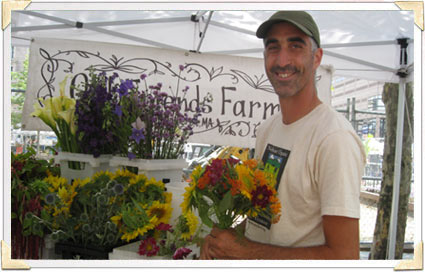Amherst, Massachusetts
Casey Steinberg (pictured) runs Old Friends Farm in Amherst, Massachusetts, with business partner Missy Bahret. They are members of CISA, Community Involved in Sustainable Agriculture, – a long time Farm Aid funded group that links farmers and consumers together through the promotion of direct markets and a buy local campaign.
Old Friends Farm was started by, well, old friends. Missy Bahret and Casey Steinberg first met while at the University of Vermont studying environmental and wilderness education. Neither had a background in farming or flowers, but their joint interests in the outdoors, hard work and providing a sustainable alternative led them to their first quarter-acre in Amherst, Massachusetts, in 2003. Five years later, what began as an experiment in cut flowers has blossomed into a 9-acre certified organic farm, producing mixed salad greens, some specialized veggies, and fields of happy flowers.
Farm Aid was able to visit with Casey at the Copley Square farmers’ market in downtown Boston where Old Friends Farm has a stand on Tuesdays and Fridays.
“You have such beautiful flowers,” a customer exclaimed while pulling together a bouquet of butter yellow calla lilies and, of all things, garlic scapes (the combo, by the way, was gorgeous!), “They actually look happy!”
Casey replied with a friendly charm, “Can a flower really be happy?” We all laughed a bit and then I threw the question right back at him. Since he was in the flower business, I was curious what he thought.
“Well, ultimately flowers are beheaded” he grinned, “but these flowers are about as well cared for as a flower gets.”
It’s not just the flowers that benefit from Casey and Missy’s impeccable care – their customers get downright spoiled too! While I was with Casey he took the time to check in with each and every patron who stopped by the tent. Whether he was custom-making a bouquet, cutting stems to size, pinching those dang orange-staining stamens off the lilies, or explaining the environmental benefits of reduced floral packaging, it was clear that he truly cared about the customer’s experience with and knowledge about the product he was selling.
In fact, both partners spoke extensively about how much they value each transaction as an educational opportunity to talk with their customers about the importance of sustainable production.
“Buying organic flowers is just on the cusp of being big,” Missy said. She, went on to explain how many of the tragedies of industrial flower production, from excessive chemical use to worker safety, are just now reaching the collective consumer consciousness. “It’s exciting to really get a feel for the growing awareness at the markets.”
In addition to their role as educators, the duo also talked about the importance of listening. “It’s not just about getting our customers to buy what we produce,” Missy said; “It’s about responding to what customers want and actually producing what they will buy.” Missy attributes paying attention to this two-way exchange as the secret to their growth and success in recent years.
But don’t be fooled – farming’s not always so rosy for the team. Both Casey and Missy reflected upon the challenges of starting a farm – and the many hats they’ve had to wear to keep operations afloat. According to Casey, “one of the most rewarding parts of farming is also the most challenging: the multi-tasking and doing everything on your own.”
Missy added to the list of challenges: “Dealing with the weather, learning the equipment, knowing when to hire – typical farm related logistics are all part of the big puzzle.”
Casey mentioned an interesting dilemma that he struggles with from time to time: putting so much energy, resources and care into producing something people can’t even eat. “Yet, if these flowers bring happiness to people,” Casey ultimately reasoned, “they’re bound to inspire good things.”
Missy shared a similar sentiment: “I enjoy watching people’s faces light up at the markets and their initial reactions when they visit our stand. Even if they don’t want to buy anything, people come in and just soak in the flowers. It’s flower therapy of sorts. We may not have any credentials, but I’m telling you, it works!”
Well, I for one felt the flower power as I wrapped up my visit and headed back to the office. I’m not sure if it was being surrounded by an array of vibrant flowers for the previous hour or, rather, if it was simply the great pleasure of getting to know a local grower who cares so passionately about his work, but I certainly felt that extra bounce in my step.
Date: 7/21/2008



